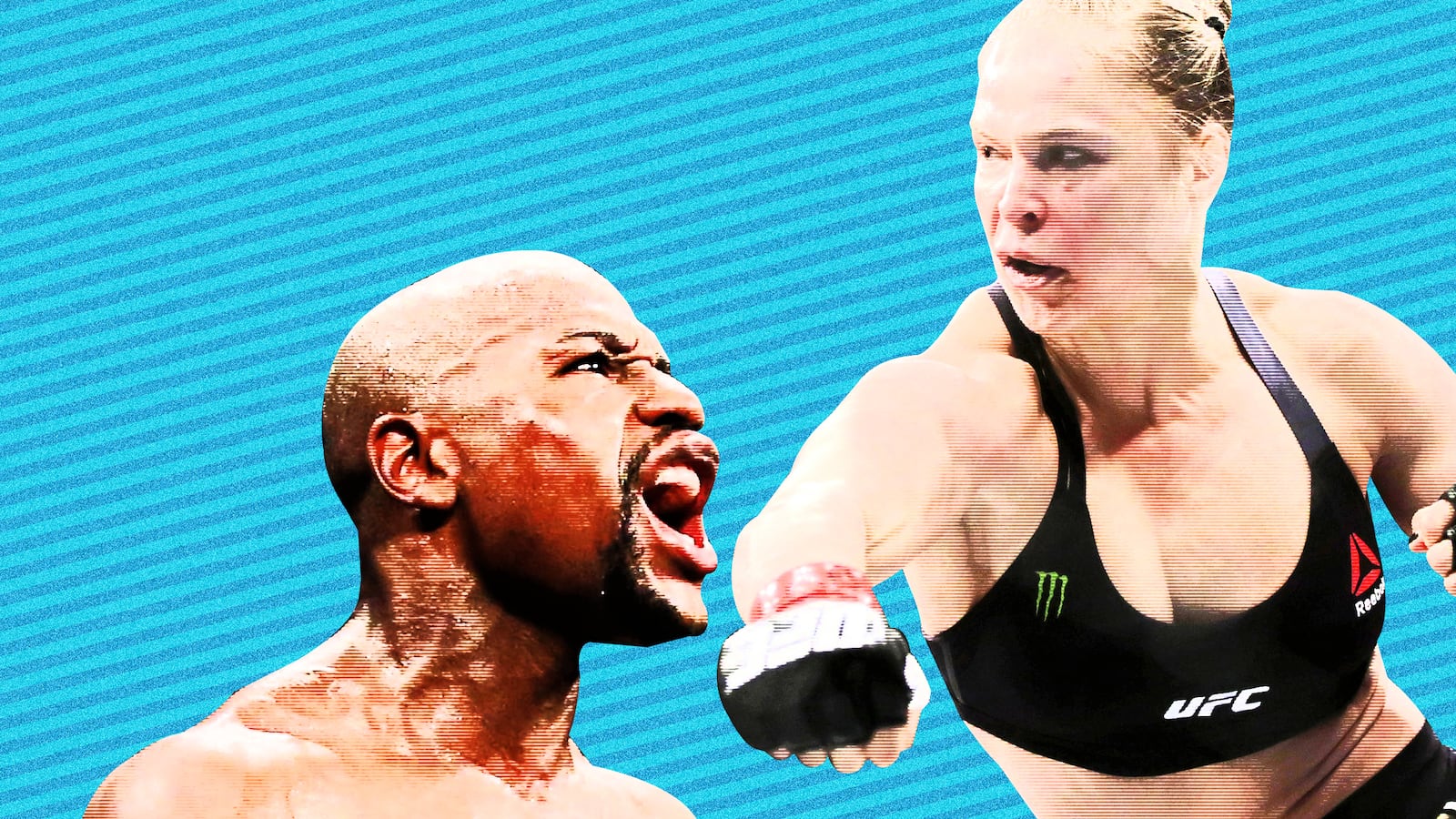Hot off the heels of her epic 34-second knockout of Bethe Correia, Ronda Rousey already has her sights set on her next opponent in the ring: documented abuser of women and winner of the highest-grossing boxing match in history, Floyd Mayweather.
Doubling down on her post-victory swagger, “Rowdy” Rousey responded in Monday night’s Reddit AMA to a question from a user under the alias “Knuckledork.”
Do you think you would legitimately beat Floyd Mayweather in a ruleless fight?
You could almost hear the crackle of Rousey’s trash-talking through the silent computer screen.
“Do I think I would legit beat Mayweather in a ruleless fight? Floyd is one of the best boxers of all time. He would definitely beat me in a boxing match. I unfortunately don’t get into “matches”. I fight for a living. In a no rules fight, I believe I can beat anyone on this planet.”
Sports and entertainment outlets been salivating over a possible showdown between Rousey and Mayweather since the two began trading public jabs.
In March of 2014, Rousey told radio station Power 106 FM that she could take Mayweather and “tackle him down.”
In turn, Mayweather has lobbed a few verbal punches at Rousey that have more than a shade of sexism in them—though they are still a relatively welcome change from the actual punches he’s known to throw at women.
When USA Today’s Bob Velin asked Mayweather in July 2014 who would win in a fight between him and Rousey last year, he responded, “I don’t even know who he is.”
Right, because the only time you could imagine a woman to be worthy of facing your athletic prowess is when she’s your girlfriend or the mother of your children?
Not one to miss the opportunity to throw her own one-two, when Rousey was asked about a potential fight with Mayweather, she told Access Hollywood in May, “I don’t think that me and him would ever fight—unless we ended up dating.”
Rousey slammed Mayweather when she took home the ESPY, saying “I wonder how Floyd feels being beaten by a woman for once.”
Admittedly, it is tempting to root for a Rousey-Mayweather battle royale for one very obvious reason: We want to see a serially-accused domestic abuser have his clock cleaned by a woman.
This could be the ultimate execution of justice against a man who beat one of the mothers of his children in front of their very eyes, according to testimony given to police in 2010 by Mayweather’s then-10-year-old son.
In theory, such a fantasy matchup satiates our desire to see an abusive man beaten by a woman, while also proving a modern-day goal that men and women can be equals in all spheres of life—including the ring.
But what exactly would be accomplished? Nothing—except potential damage to the larger fight for gender parity without providing restitution for the women who have come forward with horrifying abuse at the hands of Mayweather.
With a sport as brutally physical as boxing, MMA fighting or the “no rules” throwdown Rousey has in mind, a battle between the two could be the ultimate fetishization of violence against women. There is a risk that this fight would only glorify and promote domestic abuse.
Moreover, an actual brawl between Rousey and Mayweather would only validate the false idea that physical strength is the true mark of a person’s strength.
For millennia, humans have turned to sports to prove themselves as far more than athletes. The Olympics in Ancient Greece were established as a means of honoring the gods through displays of athleticism, while also becoming a grounds for creating political alliances and battles.
Specifically, athletic prowess has long been honored as essential to the masculine identity. Theodore Roosevelt was obsessed with expounding the virtues of brute strength.
In his 1899 “The Strenuous Life” speech, the future U.S. president praised the “virile qualities necessary to win in the stern strife of actual life.” To him, the “timid man” or the “over-civilized man” was no better than the “ignorant man,” “the man of dull mind” or even the “man who distrusts his country.”
This value on athleticism laid a foundation for Ivy League schools to formally consider it as part of their admission standards in the early and mid-20th century.
Jerome Karabel wrote about this intellectual elevation of athleticism extensively in The Chosen: The Hidden History of Admission and Exclusions at Harvard, Yale, and Princeton.
As Harvard’s dean of admission from 1952 to 1960, Wilbur Bender sought out “the boy with some athletic interests and abilities, the boy with physical vigor and coordination and grace,” because he worried the school’s football losses gave the institution a national reputation of shame.
He worried Harvard appeared to lack “healthy, social life” and that Harvard men were seen as a group of “pansies” and “precious sophisticates” (read homosexual and, therefore, sub-human in the 1950s). And all of this because of perceived athletic failings.
The additional belief that a man beating a woman at a sport—or a woman beating a man at a sport—speaks to some larger truth about the right to equal protection, pay, or respect under the law is ludicrous.
And yet, it is what permitted a chauvinist, money-hungry showman like Bobby Riggs to troll feminism by getting enough people to believe that beating Billie Jean King in 1973 would somehow prove that these “crazy” newfangled ideas about equality between the sexes were somehow lacking in merit?
King’s victory was emotionally satisfying and inspired many women—and this should not be discounted. As The New York Times put it, King’s victory “convinced skeptics that a female athlete can survive pressure-filled situations and that men are as susceptible to nerves as women.”
However, her win also didn’t fix the wage gap, improve access to birth control, or rectify many of the other challenges facing women.
In fact, it’s debatable what exactly it did prove.
King is one of the fastest to admit that it wasn’t exactly two opponents in their physical prime. Riggs “was 55. He was as old as my father [at the time]. For me to beat him meant absolutely nothing athletically. Nothing,” she told NPR in 2014.
King knew that, at a certain level, facing Riggs on the court was a zero-sum game, which is why she herself didn’t want to cave to Riggs’s taunts to play.
She told NPR that she only agreed to play him because she feared that when Riggs beat Margaret Court in the first “Battle of the Sexes,” the loss would devolve into “a good chance for some of the people to start jumping on the bandwagon to weaken Title IX, hurt our tour, to hurt women’s sports, the women’s movement.”
Supporting Rousey as any kind of feminist pioneer, as King was, isn’t easy when she has a history of making transphobic comments.
In 2013, Rousey slammed trans-MMA fighter Fallon Fox. “She can try hormones, chop her pecker off, but it’s still the same bone structure a man has,” Rousey said.
In 2014, Rousey added to the New York Post about Fox, “It’s not something that happened to her. It was a decision she made. She should be aware in her career after that, it’s going to be an arduous path. I don’t know why she’s surprised by that.”
While Rousey has somewhat tried to distance herself from her attack on Fox, she still is remarkably skeptical about the place for trans-athletes, telling HuffPost just a few months ago they should be evaluated and permitted to fight on a “case-by-case basis.”
Then there is just the general ugliness of a Rousey-Mayweather matchup.
If Rousey fought Mayweather and lost, it would be yet another victory for a man who has already beaten the justice system. Though he has been convicted of violence against women five times, he has only been made to serve one sentence.
Mayweather has already, unfortunately, “won.” No outcome in the ring will change that.
A fight with Rousey would give Mayweather the opportunity to actually financially profit off beating women.
Obviously, a sanctioned athletic activity is not remotely the same as his attacks against women in his personal life, but there is something utterly disturbing at the thought of serial abuser being paid millions to knock another woman, even a fellow fighter, out cold.
Conversely, if Rousey fought Mayweather and won, it wouldn’t erase the pain and havoc he wreaked on the lives of women. Nor would it magically improve the infrastructure we have for responding to domestic abuse or erase the stigma of being a victim of such violence.
Sure, in terms of the athletic matchup, it could potentially be barnburner. But if we mistakenly think this battle in the ring will resolve something larger about men and women, then we’re the ones being sucker-punched.
The original version of this article incorrectly stated that Don King had passed away. The Daily Beast regrets this error.






